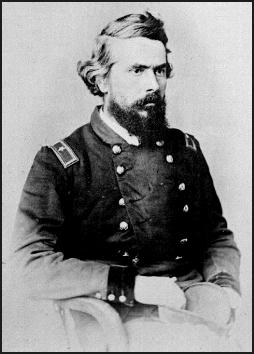Brigadier General Truman Seymour was born in Burlington, Vermont, on September 24, 1824. He attended Norwich University, a private military educational institution. After two years there, he withdrew and enrolled in the US Military Academy at West Point where he graduated in 1846. He served in the Mexican War and then taught drawing at West Point. He also fought against the Seminole Indians in Florida. When the Civil War began, Seymour took part in the defense of Fort Sumter, and was appointed brigadier general of volunteers on April 28, 1862. He served at Mechanicsville, Gaines’ Mill, Malvern Hill, Bull Run (Second), South Mountain, Antietam, Petersburg, Sayler’s Creek and Appomattox. He performed less well at Olustee; Battery Wagner, where he was wounded; and the Battle of the Wilderness, where he was taken prisoner. Upon his exchange, he led a division in the VI Corps in the Shenandoah Valley, and remained in the army until 1876. Seymour died on October 30, 1891, while traveling in Florence, Italy.
The following letter Seymour wrote shortly after his release from a Confederate prison in 1864. In it he offers his perception of the Southern cause, its pending collapse in his eyes, along with pointed observations of the Union.
In his letter he writes, “The rebel cause is fast failing from exhaustion. Their two grand armies have been reinforced this summer from the last resources of the South.†The letter is dated August 15, 1864, so his observations seem reasonable and are of no real surprise. As some historians have noted (and I am generalizing here) the South had the will to fight and sustain it for some time, but ultimately a collapse became inevitable. James M. McPherson (and others) contends that to “understand why the South lost, in the end, we must turn from large generalizations that imply inevitability and study instead the contingency that hung over each military campaign, each battle, each election, each decision during the war.†I think it’s good for historians to always be in search for “complex†and “contingent†explanations, but I also think we overlook the sometimes simple facts that are obvious.
As you read Seymour’s short letter you’ll notice he falls back on the idea that the South was controlled by a small group of “men who, to aggrandize themselves, or to gratify their own political ambition, brought this cruel war upon a peaceful and prosperous country.†(This quote is not his but a Southerner he quotes.)
I think Seymour’s letter ties in nicely with McPherson’s call for complexity, yet also points to what appear to be obvious explanations for the South’s losing the war. Anyway, I don’t know if his letter is of great historical interest, but I thought I would share it. I recently purchased it for less than five bucks so it must be a fairly common document.
Click links below for JPEG images of actual document for your own personal and educational use:
Front Cover
Page 1
Pages 2-3 (print for better reading)
Pages 4-5 (print for better reading)
Pages 6-7 (print for better reading)
Page 8
Back Cover
